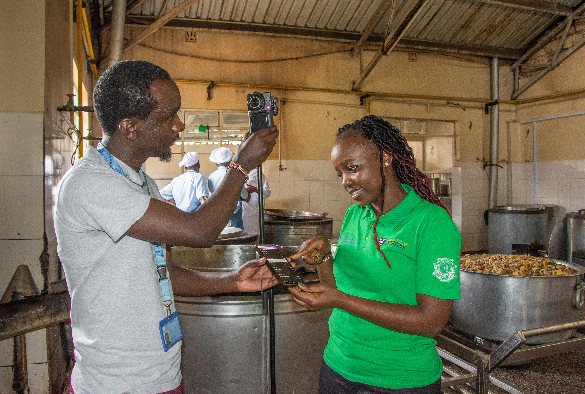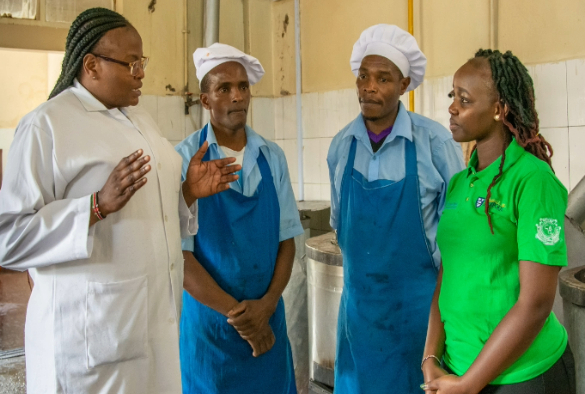
Willah Nabukwangwa is a researcher from the Kenya Medical Research Institute (KEMRI) working for the NIHR CLEAN-Air(Africa) Global Health Research Unit, a £7million program co-directed by the University of Liverpool and KEMRI. Her background is Biostatistics and Epidemiology and she has a Masters from Amref International University (AMIU) associated with prevention of household air pollution related disease from clean cooking. Her current PhD research focus for CLEAN-Air(Africa) is on clean cooking transitions in schools for the co-benefits of environment, health and education for children in Kenya and East Africa.
Effects of biomass fuel use in schools
Exposure to smoke from cooking with biomass fuels is a recogniszed global public health and developmental issue that causes a significant number of premature deaths annually. Beyond health, the use of polluting fuels negatively impacts the local environment through unsustainable harvesting of wood for cooking, and further contributes to climate change.
Despite the negative health and environment effects from reliance on biomass cooking fuels, currently more than 90% of Kenyan primary and secondary schools depend on polluting fuels to provide meals for learners estimated to result in 1 million metric tonnes of lost forest through wood fuel every year. Currently the Kenyan government and those of other East African countries are looking at how to switch schools away from this reliance on polluting wood fuel (in Kenya the government has decreed that all schools should switch to clean cooking with liquefied petroleum gas (LPG) by 2025). But how can schools switch – major barriers to transitioning to clean cooking in schools include the lack of budget to afford them, the intensity of catering needs for the school population, and a lack of awareness of the links between air pollution from cooking and health, particularly for school cooks and children.
I co-led a pilot study for CLEAN-Air(Africa) to understand the impact on air quality in schools reliant on wood and other polluting fuels for cooking in an informal settlement in Nairobi. We identified very high levels of health damaging air pollution in the school kitchens, classrooms, and playgrounds, with peak levels during cooking hours. We found the school cooks and teachers experienced common respiratory symptoms including wheezing, eye irritation, and headaches from exposure to this cooking smoke and that it directly caused disturbance to learners.

My PhD
I am now following up this work in my role with my PhD as co-lead for the Schools Clean Cooking Programme for CLEAN-Air(Africa) in Kenya. My particular interest is in the health of children who are exposed to air pollution at home from cooking with biomass, on their walks to school from traffic and garbage burning and then at school, where they spend a lot of their lives, thus experiencing their young lives exposed to pollution. Children are most sensitive to environmental pollution since they are still developing, and their small body size increases their breathing rate, which can affect their health including cognitive and respiratory outcomes directly affecting their academic proficiency. I am interested in understanding how prevention of exposure to air pollution through clean cooking at schools might positively affect the health and educational performance of children. The work of CLEAN-Air(Africa) is helping me investigate this through a partnership with the largest programme of transition to clean cooking for schools to LPG through provision of Ministry of Education loans to schools. My research on schools that convert under the scheme will provide important research evidence relevant to informing national strategies for the scale of clean cooking in schools across Kenya, and evaluating the transition impacts on education, pollution levels, and health from switching to LPG.
I am also eager to explore opportunities for working with children as agents of positive change with them becoming community advocates for clean modern energy.
Beyond PhD
In addition to my research on the Clean Cooking in Schools program for CLEAN-Air(Africa), I am a member of a fantastic interdisciplinary team at KEMRI focussing on addressing the burden of disease from air pollution in Africa. One of the best parts of working in the team is the close collaboration with colleagues from the University of Liverpool and across the CLEAN-Air (Africa) partnership. I have learned much from my mentors, including Professor Daniel Pope, and I’m now in a position to teach others as the research collaboration grows.